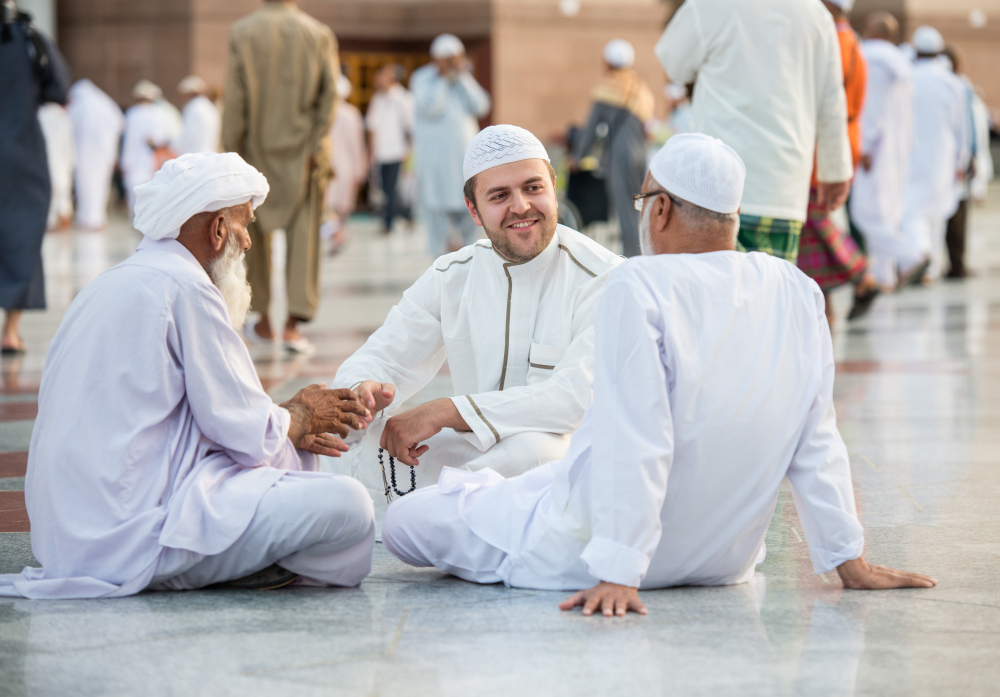The Prophet Muhammad performed his first and only Hajj, known as Hajjat al-Wida (Arabic: حجة الوداع; “The Farewell Pilgrimage”), in the year 10 AH (632 CE). Aware that this would be his final pilgrimage, he established a template for the ritual that future generations of pilgrims could emulate, as detailed in Hadith literature. Less than three months after completing the pilgrimage, he passed away in Madinah, making Hajjat al-Wida widely regarded as the pinnacle of his life’s achievements.
How Many Times Did the Prophet Muhammad Perform Hajj?
It is widely agreed that after his migration, the Prophet Muhammad performed only one Hajj. However, opinions vary regarding the number of Hajj he performed before the migration:
Twice: Jabir ibn Abdullah reports that the Prophet performed Hajj two times before migrating. He states, “The Prophet performed Hajj three times in total—twice before his migration and once after.”
Three times: Abdullah ibn Abbas recounts that the Prophet completed Hajj three times before his migration following his declaration of prophethood.
Many time: Sufyan al-Thawri mentions that the Prophet undertook numerous pilgrimages prior to his migration.
Annually: Ali ibn al-Athir, supported by Imam Ibn Hajar al-Asqalani, asserts that the Prophet performed Hajj every year before migrating. They argue that since the people of the pre-Islamic era never missed a Hajj, it is unlikely that the Prophet would have missed any, citing that he was seen performing the ritual of standing (Wuquf) at Arafat during the Jahiliyyah period, as noted by Jubayr ibn Mut’im.
After the migration, the Prophet Muhammad performed Umrah four times, donning the Ihram for each during the month of Dhul Qadah, with three of these Umrahs performed in that month and the fourth in conjunction with his Hajj during Dhul Hijjah.
Abdullah ibn Abbas reports that the four Umrahs performed by the Prophet were: the Umrah of Hudaibiyah, the compensatory Umrah (Umrat al-Qada), the Umrah from Ji’ranah, and the Umrah performed alongside his Hajj.
**Umrah of Hudaibiyah (6 AH)**: In 6 AH, the Prophet and his followers set out for Makkah intending to perform Umrah. Upon reaching Hudaibiyah on Makkah’s western outskirts, they were barred entry by the Quraysh, leading to the Treaty of Hudaibiyah. This treaty stipulated their return to Madinah with a provision to perform Umrah the following year. After negotiating, they conducted their ritual sacrifices, shaved their heads, and exited the state of Ihram, returning to Madinah.
**Umrat al-Qada (7 AH)**: Following the terms of the earlier treaty, the Prophet returned to Makkah in 7 AH and performed the Umrah, staying in the city for three days. This Umrah is also known as Umrat al-Qisas, translating to “The Fulfilled Umrah” or “The Umrah of Retribution”.
**Umrah from Ji’rana (8 AH)**: After the Battle of Hunayn in 8 AH, the Prophet performed Umrah from Ji’rana, a site where he distributed the battle’s spoils. Muharrish Al-Kabi narrates that the Prophet left Ji’rana at night, performed Umrah in Makkah, and returned by morning, making it seem as though he had spent the night in Ji’rana.
**Umrah with Hajj (10 AH)**: In his final pilgrimage year, 10 AH, the Prophet performed Umrah during the Hajj season, beginning the Ihram at the end of Dhul Qadah and completing Umrah in Dhul Hijjah.
Before the Journey to Makkah: Before his final Hajj, the Prophet had lived in Madinah for 10 years. During this period, he performed Umrah three times prior to the historic Hajj, and following the conquest of Makkah in 8 AH, he achieved significant religious and political authority. This conquest allowed him to eradicate idol worship from the Kaaba, restoring it as a monotheistic house of worship.
**The Year of Delegations (9 AH)**: Following the Prophet’s successful campaigns and the conquest of Makkah, tribes from across the Arabian Peninsula came to Madinah to embrace Islam and pledge their allegiance. This period, known as the “Year of Delegations,” saw the Prophet warmly receiving and instructing new converts, cementing his leadership and spreading the teachings of Islam across Arabia.
The Hajj of 9 AH
During the same year, the Prophet ﷺ received a new revelation which ordained pilgrimage to Makkah for all Muslims:
فِيهِ آيَاتٌ بَيِّنَاتٌ مَقَامُ إِبْرَاهِيمَ وَمَنْ دَخَلَهُ كَانَ آمِنًا وَلِلّٰهِ عَلَى النَّاسِ حِجُّ الْبَيْتِ مَنِ اسْتَطَاعَ إِلَيْهِ سَبِيلًا وَمَنْ كَفَرَ فَإِنَّ اللهَ غَنِيٌّ عَنِ الْعَالَمِينَ ❁
In it are clear signs [such as] the standing place of Abraham. And whoever enters it shall be safe. And [due] to Allah from the people is a pilgrimage to the House – for whoever is able to find thereto a way. But whoever disbelieves – then indeed, Allah is free from need of the worlds.
[Surah Aal Imran, 3:97]
Since the Prophet ﷺ was preoccupied with receiving the delegations, he could not undertake the pilgrimage himself and remained in Madinah. He appointed his close companion Abu Bakr al-Siddiq I as leader of the pilgrimage and commissioned his cousin Ali ibn Abi Talib I to proclaim the following injunction among the pilgrims, stated at the beginning of the ninth Surah:
بَرَاءَةٌ مِّنَ اللهِ وَرَسُولِهِ إِلَى الَّذِينَ عَاهَدتُّم مِّنَ الْمُشْرِكِينَ – فَسِيحُوا فِي الْأَرْضِ أَرْبَعَةَ أَشْهُرٍ وَاعْلَمُوا أَنَّكُمْ غَيْرُ مُعْجِزِي اللهِ ۙ وَأَنَّ اللهَ مُخْزِي الْكَافِرِينَ – وَأَذَانٌ مِّنَ اللهِ وَرَسُولِهِ إِلَى النَّاسِ يَوْمَ الْحَجِّ الْأَكْبَرِ أَنَّ اللهَ بَرِيءٌ مِّنَ الْمُشْرِكِينَ ۙ وَرَسُولُهُ ❁
[This is a declaration of] disassociation, from Allah and His Messenger to those with whom you had made a treaty among the polytheists. So travel freely, [O disbelievers], throughout the land [during] four months but know that you cannot cause failure to Allah and that Allah will disgrace the disbelievers. And [it is] an announcement from Allah and His Messenger to the people on the day of the greater pilgrimage that Allah is disassociated from the disbelievers, and [so is] His Messenger.
[Surah al-Tawbah ,9: 1-3]
During the pilgrimage season, it was announced that the Kaaba had been purged of idolatrous practices and returned to its former state. It was also announced that idolaters weren’t allowed to offer the pilgrimage, nor would they be permitted to perform Tawaf naked. Humaid ibn Abdur Rahman I narrated that Abu Huraira I said:
During that Hajj (in which Abu Bakr was the leader of the pilgrims), Abu Bakr sent me along with announcers on the Day of Nahr (10th of Dhul Hijjah) in Mina to announce: ‘No pagans shall perform Hajj after this year and none shall perform the Tawaf around the Kaaba in a naked state.’ Humaid ibn Abdur Rahman added: ‘Then Allah’s Messenger ﷺ sent Ali ibn Abi Talib (after Abu Bakr) and ordered him to recite Surah al-Tawbah aloud in public. Abu Huraira added: ‘So Ali, along with us, recited Surah al-Tawbah loudly before the people at Mina on the Day of Nahr and announced: ‘No pagan shall perform Hajj after this year and none shall perform the Tawaf around the Kaaba in a naked state.’4
It was almost certainly on the occasion of this pilgrimage that the Arab practice of intercalation, a system which tried to reconcile the solar and lunar years through the addition of an additional month at certain intervals, thereby affecting the sacred months, was also abolished. The prohibition of intercalation is stated in the Quran.5
It appears that the Hajj led by Abu Bakr al-Siddiq I and Ali ibn Talib I in 9 AH was a form of preparation for Hajjat al-Wida, which was carried out by the Prophet ﷺ the following year.
The Announcement of Hajj (10 AH)
Early in 10 AH (631 CE), the Prophet ﷺ publicly announced his intention of personally conducting the pilgrimage, now that the Kaaba had been purified of idolaters, and invited the Muslim community to accompany him. The news spread and people travelled to Madinah in their droves, by
foot or on mounts, with the hope of performing Hajj in the blessed company of the Prophet ﷺ. Jabir ibn Abdullah I narrates:
The Messenger of Allah ﷺ stayed in Madinah for nine years during which he did not perform Hajj. It was then announced among the people that he was going to perform Hajj this year. Many people came to Madinah, all of them hoping to learn from the Messenger of Allah ﷺ and to do as he did. The Messenger of Allah ﷺ set out when there were five days left of Dhul Qadah and we set out with him.


